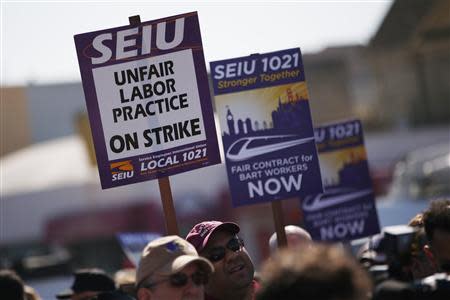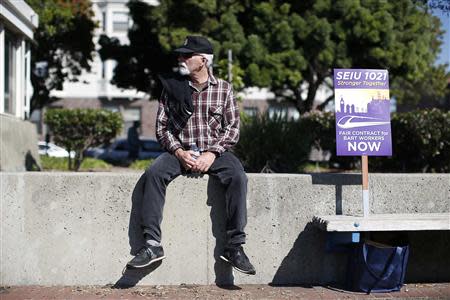No end yet for BART strike in San Francisco
SAN FRANCISCO (Reuters) - San Francisco faced another day without its commuter rail system on Sunday with no new strike talks scheduled to resolve the labor dispute. Vigils were planned in honor of two workers who were struck and killed by a train as they checked a section of the track over the weekend. The strike against the Bay Area Rapid Transit agency, which carries about 400,000 riders a day, began on Friday after contract talks broke down over pay and workplace rules. With no negotiating talks scheduled, the walkout is expected to snarl traffic in the coming week as the city returns to work. On Sunday, members of one of the unions leading the strike planned vigils for the two workers, according to a spokeswoman for the Service Employees International Union Local 1021. A second union, Amalgamated Transit Union Local 1555, canceled picket lines for the day because of the deaths. Its members, among the more than 2,000 BART workers on strike, will resume picketing on Monday, it said on its website. Antonette Bryant, the president of the ATU Local 1555, said her union would put the latest contract offer to a vote, but predicted it would be rejected, the San Francisco Chronicle reported. The vote would not be scheduled until later in the week, the newspaper said. "BART has left us no choice but to reject their final offer," Bryant told the Chronicle. The SEIU Local 1021 declined to say whether its members would vote on the offer, the newspaper reported. The two workers killed on Saturday were a BART employee and a contractor, BART officials said. One of the workers belonged to the American Federation of State, County and Municipal Employees, which is not on strike. They were checking a possible dip in the track just north of the station in suburban Walnut Creek when a BART train functioning on automatic control, with an operator inside, struck and killed them, the agency said in a statement. The train was being taken to a maintenance yard to have graffiti removed, BART said. The National Transportation Safety Board is investigating the deaths, BART said. The BART walkout is the second this year, after unionized workers went on strike for 4-1/2 days in July. The unions and BART management were unable to reach a deal in the following months. Commuters have expressed frustration at the stalemate and experts say the strike will be an economic drag. The July work stoppage caused between $73 million and $100 million a day in lost productivity for riders, said Rufus Jeffris, spokesman for the Bay Area Council, which studies the local economy. Unions announced the latest strike on Thursday, and a federal mediator ended efforts at conciliation, saying there was no more he could do. The two sides have not met since Thursday. BART commuter rail service helps alleviate vehicle traffic in San Francisco, which ranks as the third most congested metropolitan area in the nation after Los Angeles and Honolulu, according to roadway traffic software company INRIX Inc. (Reporting by Laila Kearney and Noreen O'Donnell; Editing by Ellen Wulfhorst and Stacey Joyce)


